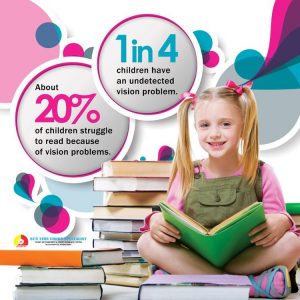Services
DYSLEXIA AND VISION THERAPY
Dyslexia is a prevalent learning difficulty characterized by challenges in learning, reading, and interpreting words, letters, and symbols. It falls under the category of ‘specific learning disabilities’ but does not impact general intelligence. Learning to read involves both phonetic (sound-based) and eidetic (visual) processes, and vision issues can disrupt the encoding and decoding of words. In essence, vision problems can lead to difficulties in sight recognition, reading comprehension, memorization, recall, fluency, reading or writing speed, rhythm, and the duration of time spent on these tasks.
To understand how a Neuro-Developmental & Behavioral optometrist can assist in diagnosing and managing vision-related learning difficulties in individuals with dyslexia, it’s beneficial for patients to have a basic understanding of dyslexia categories.


The crucial focus should be on finding solutions to alleviate the challenges the child faces, making their learning journey more accessible. Let’s ensure that labels and terminology do not overshadow the needs of the child.
In the following section, we will delve into the three most prevalent types of dyslexia and explore how Neuro-Developmental & Behavioral optometrists can provide valuable assistance.
Dysphonesia
A condition characterized by difficulties in letter-sound integration. Individuals with dysphonesia struggle to connect words or letters with their corresponding phonetic sounds, making it challenging for them to decipher unfamiliar words using techniques like phonics, syllabication, or structural analysis. This primarily affects decoding abilities. Dysphonetics rely on eidetic coding, which involves memorizing words rather than sounding them out. Words like “pneumonia” and “mnemonics” exemplify eidetic coding. While they may recognize familiar words, dysphonetics encounter difficulties decoding unfamiliar or multisyllabic words due to their struggles with blending sounds. For instance, after learning the word “deal,” they might still struggle with “seal” or not know how to read “dealing.” These individuals often require more educational support than optometric intervention, although addressing any vision-related issues that contribute to their challenges can be beneficial.
Dyseidesia
A condition involving whole-word decoding, a global process where words are recognized based on their overall shape and configuration. In contrast to dysphonesia, dyseidetic individuals have difficulty perceiving whole words or configurations as unit symbols or gestalts. They can, however, utilize phonetics, syllabication, and structural analysis for word recognition, indicating weaker word attack skills. 
Dysnemkinesia
A condition involving memory and motor movement. Dysnemkinesia is characterized by a high frequency of letter reversals, a hallmark feature of what most people associate with dyslexia. This condition primarily results from developmental issues related to visual spatial skills, particularly laterality and directionality. Dysnemkinesics struggle with symbol orientation and often fail to differentiate between letters like “p,” “b,” “q,” and “d” when oriented differently, leading to confusion and transpositions. They also exhibit faulty eye movements, excessive reversals, and spatial difficulties. Dysnemkinesics typically struggle with sight recognition and building a sight vocabulary. Their reading tends to be slow and laborious, as they often rely on phonetic reading and spelling. Fortunately, dysnemkinesia is relatively easier for optometrists skilled in vision training to identify and manage.
Note: It is possible for individuals to experience one or more types of dyslexia simultaneously, such as dysphoneidetic and dyseidesia etc. You are welcomed to contact Neuro Vision Specialist for proper assessment.
WHAT TO DO IF YOU SUSPECT A CHILD MIGHT HAVE DYSLEXIA?
Given the crucial role vision plays in our learning and information processing, children struggling with reading and spelling difficulties may have underlying issues related to visual coding. Therefore, it is advisable to arrange a comprehensive optometric evaluation encompassing various aspects of vision function, including input, processing, storage, retrieval, and output.
Research has demonstrated the potential benefits of behavioral optometric interventions, such as vision therapy, for individuals previously diagnosed with dyslexia, reading or learning disabilities, and children facing academic challenges. It’s worth noting that there is no age restriction for vision therapy. However, it’s essential to recognize that early intervention can have a more significant impact on academic performance. The longer a person goes without therapy, the further they fall behind in school, which can lead to lower self-esteem and a more extended period to rectify poor learning habits or compensatory strategies.
It’s important to note that not all optometrists specialize in addressing learning-related vision problems. Neuro Vision Specialist is a certified optometry center that offers specific eye screenings for dyslexia and learning difficulties. Neuro Vision Specialist founder, Mr. Stanley Tien, a Neuro-Developmental and Behavioral Optometrist in Malaysia, is Board Certified in Vision Development and Vision Therapy (FCOVD).
Regarding vision therapy and dyslexia, it’s crucial to understand that while it is the responsibility of a Neuro-Developmental & Behavioral Optometrist to diagnose and treat visual dysfunctions that can affect learning and reading, optometrists do not directly treat learning or reading disabilities. Specialized learning specialists and educators are dedicated to addressing these specific challenges. Vision therapy can be a valuable component in improving academic performance, but often, a multidisciplinary approach involving collaboration with other professionals who specialize in learning disabilities is the most effective course of action
